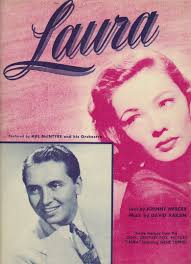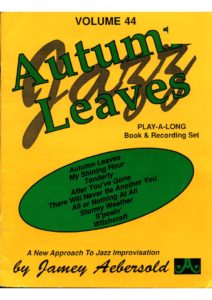Browse in the Library:
Or browse in the categories menus & download the Library Catalog PDF:
Laura, by Johnny Mercer and David Raskin – Jazz Play Along
Sheet music available in our online sheet music Library
“Laura” is a 1945 popular song. The music, composed by David Raksin for the 1944 movie Laura, which starred Gene Tierney and Dana Andrews, is heard frequently in the movie. The film’s director, Otto Preminger, had originally wanted to use Duke Ellington‘s “Sophisticated Lady” as the theme, but Raksin was not convinced that it was suitable.
Angered, Preminger gave Raksin one weekend to compose an alternative melody. Raksin later said, and maintained for the rest of his days, that when, over that weekend, his wife sent him a “Dear John” letter, the haunting theme seemed to write itself.

The lyrics were written by Johnny Mercer after the film made the tune popular. According to Mercer, he had not yet seen the movie when he wrote the lyrics but was aware that it was a romantic, somewhat haunting story.
Laura is the face in the misty light, footsteps that you hear down the hallThe laugh that floats on the summer night that you can never quite recallAnd you see Laura on a train that is passing through, those eyes how familiar they seemShe gave your very first kiss to you, that was Laura but she’s only a dream.
The song became a jazz standard and has been recorded over 400 times. Some of the best-known versions are by Woody Herman, Dave Brubeck, Johnny Johnston, Emil Newman, David Rose, Billy Eckstine, Charlie Parker, J. J. Johnson, Carly Simon, Frank Sinatra and Julie London (included on her 1955 debut album Julie Is Her Name, Vol. 1).
The first 10 notes of the song are sometimes “quoted” during jazz solos, especially since Dizzy Gillespie did it during his “Perdido” solo at the famous Massey Hall concert in 1953.

Laura: the film
Conceived amidst conflict, the title theme for the 1944 Twentieth Century Fox film Laura was composed almost as an afterthought. According to author William Zinsser in his book, Easy to Remember: The Great American Songwriters and Their Songs, director Otto Preminger had chosen Duke Ellington’s “Sophisticated Lady” as a theme for Laura, but composer David Raksin felt it did not suit the character. Raksin was given the weekend to come up something new. By Sunday, with nothing satisfactory on paper, he read a “Dear John” letter from his wife, and the haunting melody seemed to write itself.
Shortly after Laura was released, Abe Olman of Robbins Music asked Johnny Mercer to write lyrics for Raksin’s theme. Although Mercer had seen the film, he confessed that he really didn’t remember the tune. Olman provided Mercer with the music and advised him that the title had to be “Laura.” After a few weeks, Mercer grew to love the song and completed the lyrics. In 1945 five separate recordings of “Laura” appeared on the pop charts with the Woody Herman and His Orchestra’s rendition becoming a million-seller hit:
- Woody Herman and His Orchestra (Woody Herman, vocal, #4)
- Johnnie Johnston (with Paul Baron and His Orchestra, #5)
- Freddy Martin and His Orchestra (#6)
- Jerry Wald and His Orchestra (Dick Merrick, vocal, #8)
- Dick Haymes (with Victor Young and His Orchestra, #9)
In 1946 “Laura” made it to number one on the Hit Parade for 14 weeks and five years later Stan Kenton and His Orchestra made it to #12, featuring Art Pepper’s alto sax.
Laura, starring Gene Tierney, Clifton Webb, Dana Andrews, and Vincent Price has enjoyed great popularity and is considered one of the best-scripted and wittiest examples of the 1940’s and 1950’s film noir wave. It was nominated for five Academy Awards, including Best Actor (Webb), Best Director (Preminger), and Best Screenplay, and won for the category Best Cinematography, Black-and-White. Oddly enough, in retrospect, the score went unacknowledged.
The sophisticated dialogue and stylish atmosphere, in juxtaposition with the underlying themes of murder and betrayal, make the film particularly intriguing. In his book Great Hollywood Movies, Ted Sennett says of Laura, “…its principal fascination lies in the many perverse and distasteful implications that are concealed beneath its surface.”
Raksin’s theme and variations are played throughout the film and, with a few exceptions, constitute the soundtrack. Film critic Roger Ebert comments, “That Laura continues to weave a spell–and it does–is a tribute to style over sanity. No doubt the famous musical theme by David Raksin has something to do with it. The music lends a haunted, nostalgic, regretful cast to everything it plays under, and it plays under a lot.”
Indeed, in a self-conscious gesture, the film’s characters even refer to the soundtrack theme. Detective McPherson (Andrews) enters Laura’s apartment with her mentor Waldo Lydecker (Webb) and her fiancee Shelby Carpenter (Price). McPherson turns on the phonograph and plays “Laura.”
Lydecker: “Would you mind turning that off?”
McPherson: “Why, don’t you like it?”
Carpenter: “It was one of Laura’s favorites, not exactly classical, but sweet.”
Nearly two decades after winning the “Laura” debate with Preminger, Raksin further demonstrated his leadership skills becoming President of the Composers and Lyricist Guild of America (1962-70). In that capacity he took a delegation of American composers to Brazil for a popular song festival where, upon request, he sang “Laura” for an audience of 18,000, adding a Portuguese finale!
When Olman asked Mercer to add lyrics to “Laura,” Mercer was faced with a double challenge. He would not only have to write quality lyrics for a complex and established song but also pen words that would perpetuate the weighty intrigue of a character with whom the public was already acquainted. Mercer created what many feel is an example of his finest work, immortalizing a tune that might otherwise have drifted into obscurity.
Mercer’s lyrics extend the feeling of mystery and intrigue in the introductory verse,
“You know the feeling of something half remembered,
Of something that never happened, yet you recall it well.”
…
and subsequently by describing Laura through a series of elusive attributes: a face in the misty light, footsteps down the hall, a floating laugh, and as a woman on a passing train. With no variations and just a sixty-two-word refrain, the lyrics are handled economically as well as effectively.
David Raskin
David Raksin is well known for composing the soundtracks to the films Laura (1944), Forever Amber (1947) and Separate Tables (1958), the latter two receiving Oscar nominations for Best Score. A fourth, the remarkably sensual The Bad and the Beautiful (1952), has never received the attention it deserves.
Raksin has composed, arranged, orchestrated, and scored for hundreds of plays, movies, and television shows, also writing for ballet and the concert hall. Among his film credits are a surprising number of Westerns–Across the Wide Missouri (1951), A Big Hand for the Little Lady (1966), and Will Penny (1968). He also scored the TV series, Wagon Train (1957) and the TV movie The Ghost of Flight 401 (1978).
One of the early films on which he served as arranger was Charlie Chaplin’s Modern Times (1936). Other films for which he is credited include The Shocking Miss Pilgrim (1946) with Betty Grable, Daisy Kenyon and The Secret Life of Walter Mitty (1947), Pat and Mike (1952) with Tracy and Hepburn, and Twilight for the Gods (1958) with Henry Fonda and Joanne Woodward.
Raksin also wrote an autobiography, If I Say So Myself, which is awaiting publication.
Johnny Mercer
Johnny Mercer was born in Savannah, Georgia, and he called upon the imagery of the southern landscape and its idiosyncrasies of speech for his lyrics. His relaxed and charming singing style also reflected the genteel South. He came to New York and, fortunately for posterity, failed to get a role in a 1930 show, contributing a song instead and turning his attention to music. As a vocalist he racked up 29 hits between 1938 and 1952, and as a lyricist he holds the record for the most #1 songs on the “Hit Parade.”
Mercer collaborated with the great songwriters. His lyrics were hip, and he was a magician with words. Of some 1500 songs, his first hit was Hoagy Carmichael’s “Lazybones” (1933), followed by “Skylark” (1941). With Jimmy Van Heusen he penned the popular “I Thought About You” in 1939. He and his partner for a decade, Harold Arlen, hit the charts with “Blues in the Night” (1941) and “That Old Black Magic” (1942). In 1944 Bing Crosby introduced their “Accentuate the Positive” in Here Come the Waves.
In 1942 Mercer wrote lyrics for “I’m Old-Fashioned” (Jerome Kern) and for “I Remember You” and “Tangerine” (Victor Schertzinger) and became one of the founders of Capitol Records. In 1947 he collaborated with Sonny Burke and Lionel Hampton on the jazz classic “Midnight Sun,” and in 1958 he added lyrics to the Duke Ellington / Billy Strayhorn instrumental “Satin Doll.”
During Mercer’s active film career he supplied lyrics to David Raksin’s haunting theme for Laura (1945), to 1953’s Charade, and to Johnny Mandel’s “Emily” (The Americanization of Emily, 1964). Among his Oscar winners are “On the Atchison, Topeka, and Santa Fe” with Harry Warren (1946) and “Moon River” with Henry Mancini (1961). He also scored several Broadway shows, including Li’l Abner, 1959.
Mercer is one of the songwriters honored by a stamp from the U.S. Postal Service in 1996.
Browse in the Library:
Or browse in the categories menus & download the Library Catalog PDF:
